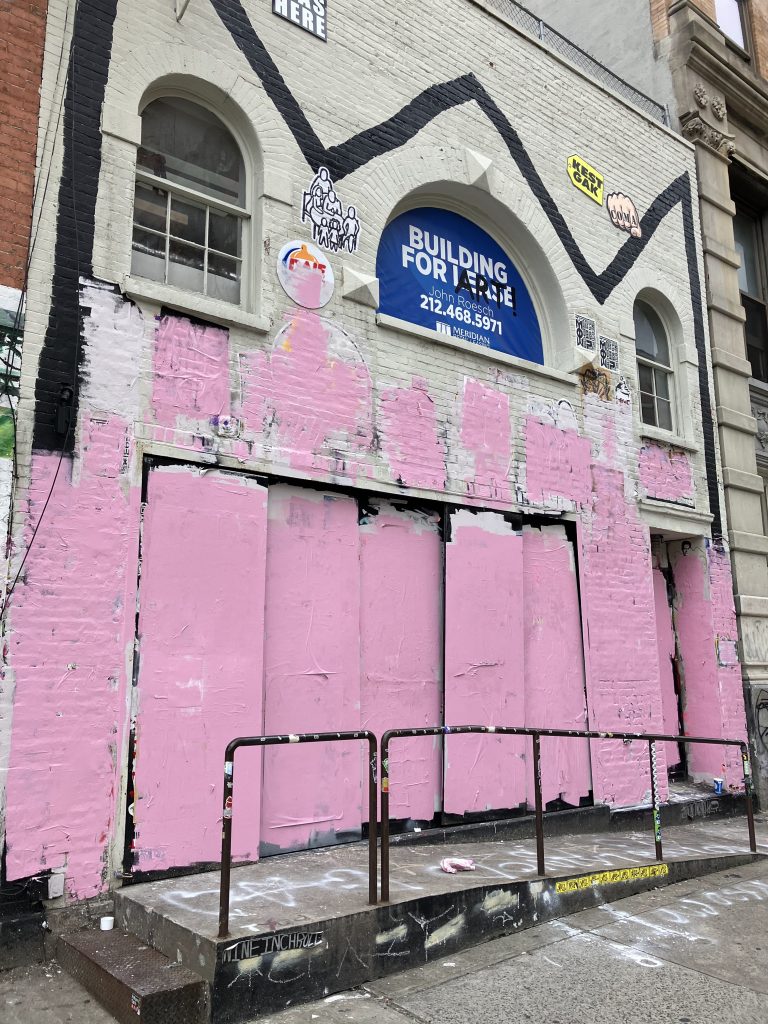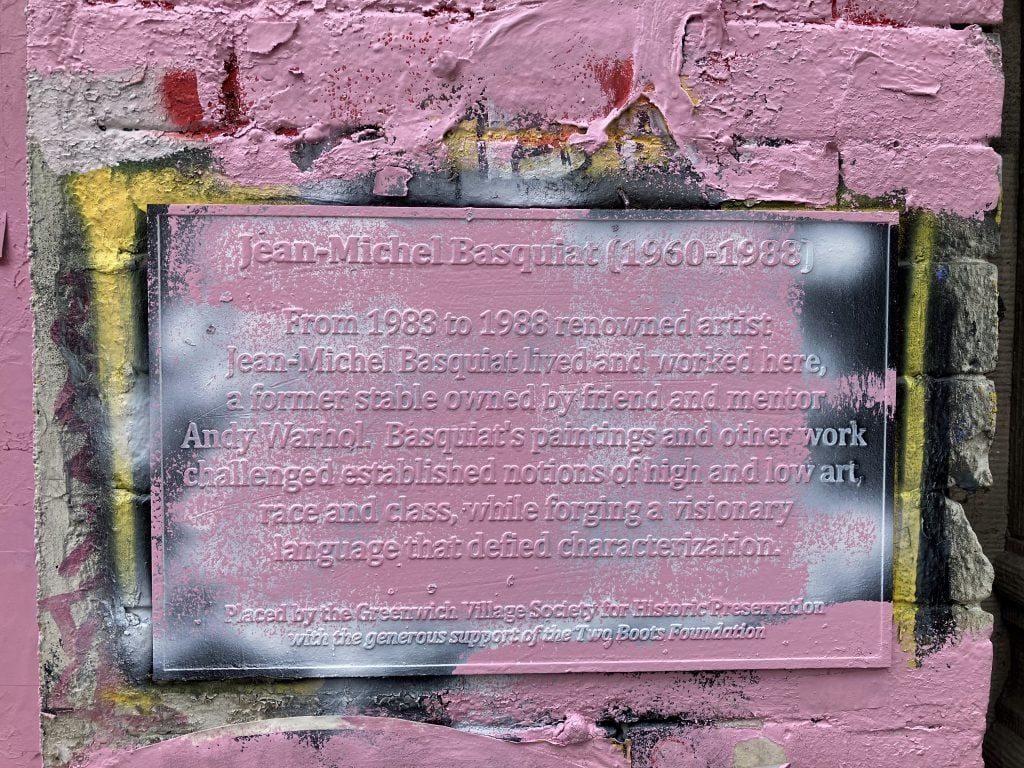Street artists have long accepted that their work is by nature ephemeral, subject to not only the elements, but the whims of property owners, who may or may not appreciate their work.
But over the past two months or so, the graffiti community has been outraged by one artist’s repeated whitewashing of the building where Jean-Michel Basquiat lived and worked until his death by overdose in 1988. The studio at 57 Great Jones Street has long been a historic New York City graffiti spot, and the erasure of tributes there has made headlines before. But for some street artists today, the destruction of this ever-evolving display is even more galling when it’s ostensibly one of their who is own responsible.
“There aren’t rules, but there are guidelines,” street artist and photographer Adrian Wilson, who once staged a Basquiat tribute exhibition in the space and has contributed to the building’s exterior graffiti display on numerous occasions over the years, told Artnet News. “Ideally, there’s a certain amount of respect.”
Since July 10, an artist named Roberto Palacio appears to have removed or painted over the former Basquiat studio and its multi-layered artworks on three separate occasions. He has shared videos taking credit for the whitewashing on his Instagram account, claiming to be performing under the alter ego Jericho Drumm—a Marvel character of Haitian origin also known as Brother Voodoo.
His actions have not been well received by more established figures in the scene.
“The site is New York City street art history. New graffiti shows up on the building on a daily basis,” Sinclair the Vandal, a street artist who has been adding to the ever-evolving display at the 57 Great Jones Street for several years, told Artnet News. “I would never disrespect others to get some cheap attention like this guy is doing.”
“The idea that [Palacio] thinks that he has the right to wipe out all of those other artists just as a publicity stunt seems pretty arrogant and inconsiderate—of other artists, and of Jean-Michel, because he would never have done that,” Wilson added. “It’s just not right.”
Palacio did not immediately respond to inquiries from Artnet News, but had previously shared some of his Instagram posts about removing graffiti from the building with this reporter by DM.
Palacio began targeting the Basquiat tribute after actress Angelina Jolie (also a noted art collector) signed an eight-year lease for the building, which she plans to use as the headquarters for her new tailoring business collective, Atelier Jolie.
The building had been on the market since November, with rent of $60,000 a month, and was previously home to Bohemian, a members-only restaurant. But where Bohemian’s parent company, Play Earth Inc., controversially buffed the building in 2022, Jolie announced her lease signing with an Instagram video of someone spray painting a stencil of the atelier logo to the facade’s array of street art.
Days later, Palacio peeled away layers of stickers and wheat-pasted art affixed to the building’s facade, posting an Instagram Reel of himself ripping the art down.
“I decided to repurpose and reimagine the act by Robert Rauschenberg, Erased De Kooning (1953),” Palacio wrote on Instagram, dubbing his own action The Erasure of Jean (Reverse vandalism, Silent protest). In another post, he described making “numerous attempts to reach out to anyone that can help me assess the space of 57 Great Jones” and meeting with realtors John Roesch and Garrett Kelly to show them some of his paintings and a business plan.
Reached by phone by Artnet News, Roesch declined to comment on whether or not these meetings took place, and about the recent kerfuffle over the building’s exterior.
When the art world failed to take notice of his first action, Palacio took things to the next level: whitewashing the entire first floor of the building’s exterior on July 26. It was quickly clear that Jolie’s people were not responsible, as Palacio again began posting on Instagram taking credit for the artworks’ destruction.
In the aftermath, Wilson was quick to return to the scene. On July 11, the day after Palacio’s first “performance,” he had painted a two-story Basquiat-style crown on the facade, and graffitied the advertisement on the second-floor window to read “building for art” instead of “lease.”
“It’s about Basquiat, it’s not about me. But this guy [Palacio], it’s about him, not about Basquiat,” Wilson said. In response to the whitewashing, Wilson painted a quote from recently deceased singer Sinead O’Connor—“if you live with the devil, you find out there’s a god”—on the newly blank wall, and retouched the bottom of the crown, which he had painted with the support of Wayne Rada of downtown street art charity the Lisa Project, who supplied a ladder and other materials.

Basquiat’s former studio at 57 Great Jones St. was covered in pink paint in August 2023. Photo courtesy of EV Grieve.
Soon, the facade was being covered anew with artwork—tags, stencils, and stickers from a wide variety of artists not only looking to pay tribute to Basquiat, but also hoping that a little bit of his fame might rub off on them, especially now that Jolie was involved with the property and would potentially see their art.
But Palacio was not done. Last week marked the third incident. This time, he covered the walls in Pepto Bismol pink, even going so far as to paint over the commemorative plaque identifying the building as Basquiat’s former home, installed by the Greenwich Village Society for Historic Preservation in 2016.
“The Basquiat spot was always someplace where the wheat pasters and the taggers would make their mark,” Rada of the Lisa Project told Artnet News. Erasing everything that everyone else has made, he argued, is “just a dick move—there’s no reason to do that,” he added. “It’s just shallow and pathetic and useless.”
Both Sinclair and Wilson described Palacio as an unknown figure prior to his targeting the 57 Great Jones Street property.
“Never heard of him,” Sinclair said.” Not in the gallery scene nor the streets, and he has a very small social media presence.”
In addition to painting over the Basquiat building, Palacio has created an accompanying work on canvas, titled The erasure of, Jean- ll. According to the artist’s Instagram, the 17-by-seven-inch work, made with the same pink acrylic paint used to buff the building, is available for $40,000.
“The PINK paint was chosen for femininity yielding to rebirth through psychic possession as Im channeling Jericho Drumm through art expression,” Palacio wrote in on Instagram. Another post likened the color to the womb. (He did not, however, mention Barbie.)

Basquiat’s former studio at 57 Great Jones St. was vandalized in August 2023. Photo courtesy of EV Grieve.
One comment on Palacio’s Instagram argued that “vandalizing a plaque that commemorates another artist is not a protest but the feeble act of a wannabe.”
“Still cant believe you desecrated Basquiat’s memorial like that,” another added. “So disrespectful.”
And: “Basquiat would hate your art dude.”
Follow Artnet News on Facebook:
Want to stay ahead of the art world? Subscribe to our newsletter to get the breaking news, eye-opening interviews, and incisive critical takes that drive the conversation forward.
"artist" - Google News
September 07, 2023 at 05:08AM
https://ift.tt/akfYdxc
A Street Artist Keeps Whitewashing the Graffiti at Basquiat’s Former Studio. His Fellow Artists Are Outraged by the ‘Desecration’ - artnet News
"artist" - Google News
https://ift.tt/p79vEf6
Bagikan Berita Ini














0 Response to "A Street Artist Keeps Whitewashing the Graffiti at Basquiat’s Former Studio. His Fellow Artists Are Outraged by the ‘Desecration’ - artnet News"
Post a Comment